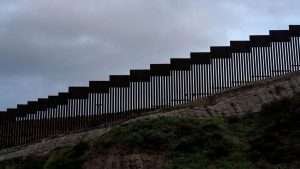The Volokh Conspiracy
Mostly law professors | Sometimes contrarian | Often libertarian | Always independent
Congress Overrides Trump Veto of Defense Bill that Includes Tight Constraints on Use of "Emergency" Powers to Divert Military Construction Funds to the Border Wall and Other Projects
This would prevent repetition of some of the shenanigans Trump has used to divert funds for his border wall project.
Earlier today, the Senate overwhelmingly voted to override President Trump's veto of the National Defense Authorization Act, thus handing Trump the first veto override of of his term. Section 2801 of the Act limits the president's ability to use "emergency" declarations to divert military construction funds to no more than $100 million per year for construction within the United States. This largely closes the loophole Trump tried to use to fund parts of his border wall project, using an emergency declaration he issued in 2019, thereby laying claim to some $3.6 billion.
In my view, this part of Trump's border wall funding diversion was already illegal for reasons described in a recent Ninth Circuit decision ruling against the administration on this issue. I also wrote about these issues here. The new law just makes this point more clear going forward.
The new NDAA doesn't affect the ongoing litigation over Trump's previous diversion of funds, because it only applies to newly appropriated funds, not those Trump has laid claim to from the previous NDAA. In addition, much of the funding Trump has tried to use does not rely on his emergency declaration, but rather on dubious manipulation of Section 8005 of the 2019 NDAA. Lower courts have ruled against Trump on that diversion, as well, but the case is currently before the Supreme Court (though the litigation might not continue of President-elect Biden keeps his promise to immediately terminate the funding diversions and associated wall construction). Section 1001 of the new NDAA does, unfortunately, include language similar to that of Section 8005 in the 2019 one.
As a practical matter, this limitation in the new NDAA probaby won't have much, if any, effect on Trump's border wall project, because Biden is likely to terminate it soon, anyway. But it will make it harder for Biden - or another future president - to usurp Congress' spending power and use "emergency" declarations to convert the military construction budget into a piggy bank for his personal pet projects.
More needs to be done to curb presidential abuse of "emergency" declarations, and usurpation of the spending power. Both have been serious problems under Trump, who declared a dubious emergency at the border in order to secure funding Congress had denied for his wall, repeatedly tried to circumvent Congress' power of the purse for such purposes as attacking sanctuary cities and pressuring Ukraine to launch an investigation of Joe Biden and his son. It would be naive to imagine that future presidents won't engage in similar shenanigans, if the opportunity arises. But though it is not a complete solution to these problems, Section 2801 of the new NDAA is at least a step in the right direction.
Obviously, the NDAA includes many other provisions. As with any large spending bill, there are many that I am not a fan of. But I'm still happy Congress overruled Trump's veto, because his proposed changes - adding a repeal of Section 230 protection for website providers and subtracting a provision changing the names of military bases named after Confederate generals - would have made the bill worse, not better.
Section 230 repeal (an idea backed by many on both left and right) is a terrible idea for reasons well-summarized by Hannah Cox here. Eliminating monuments (and base names) honoring Confederate leaders is desirable for reasons I outlined here and here. It especially makes no sense for the US military to have major bases named after men who fought to break up the US for the profoundly evil purpose of perpetuating slavery.
That said, perhaps the soon-to-be-renamed Fort Bragg should still include some sort of commemoration of General Braxton Bragg, widely considered to be one of the worst generals of the Civil War. His incompetence made a major contribution to the Union cause! He did more to bring about Union victory in the West than any other general on either side, with the possible exceptions of Grant and Sherman. That, arguably, deserves some recognition.
UPDATE: I have made a few minor additions to this post.



Show Comments (118)